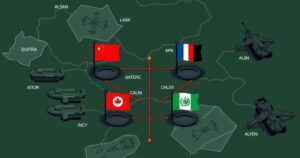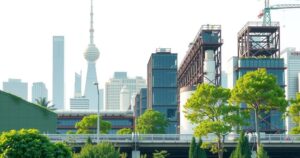Clash in the Oval Office: Trump Challenges Ramaphosa on Farm Violence Issues

During a meeting at the White House, former President Trump confronted President Ramaphosa over allegations of farm land seizures and violence in South Africa. While Trump cited conservative media claims, Ramaphosa defended South Africa’s land reform process as legal and aimed at rectifying historical injustices. The meeting’s fallout may impact diplomatic relations between the U.S. and South Africa.
In an unexpected twist during a scheduled meeting at the White House yesterday, South African President Cyril Ramaphosa faced off against former U.S. President Donald Trump. The originally planned discussion, intended to cover trade and regional security, quickly veered off course when Trump raised longstanding allegations concerning farm seizures and violence linked to farms in South Africa.
What started as a routine diplomatic exchange rapidly became contentious. Sources in the room said the atmosphere transformed swiftly—”It felt more like a set-up than a summit,” noted one diplomat familiar with the discussions. Trump, back in the political spotlight, reportedly challenged Ramaphosa on claims regarding his government’s treatment of white landowners and farmers, citing conservative media reports as evidence of these claims.
During the meeting, Trump alluded to video clips from 2018 which he claimed highlighted state-sanctioned land seizures and murders. He posed direct inquiries, such as, “Isn’t it true your government is taking land without compensation?” while bringing printed material from an American news outlet to support his argument.
Ramaphosa, as per accounts from attendees, responded assertively but maintained a civil demeanor, emphasizing that South Africa’s land reform efforts are legitimate and well-structured. He stated that these efforts were designed to rectify historical injustices instead of targeting specific ethnic groups, asserting, “There is no state policy of confiscation. There is no campaign of killing. We are a constitutional democracy.”
On the matter of farm violence, the claims that the South African government is systematically confiscating farms and killing white farmers lack substantive evidence. While there have been discussions regarding potential constitutional amendments aimed at facilitating expropriation without compensation, large-scale seizures have not taken place. The goal remains to redistribute land within a society where apartheid had entrenched inequities.
Both black and white farmers are at risk of violent crime, as reported by the South African Police Service and independent analysis. The murder rate is indeed notably high among farmers compared to the general populace, but there exists no official documentation suggesting these murders are racially or politically driven. In fact, the U.S. Embassy in South Africa stated in 2018 that they found no evidence of a coordinated campaign against white farmers. Assertions of genocide regarding these killings have also been systematically debunked by credible organizations such as Africa Check and Human Rights Watch.
Post-meeting, Ramaphosa’s team issued a subdued statement which mentioned that there had been a “frank exchange of views” and reiterated a mutual commitment to ongoing dialogue. Conversely, Trump took to his social media platform to declare that he had confronted Ramaphosa with facts that “the fake media won’t report.”
The aftermath of this meeting raises concerns about the broader implications for diplomatic relations. While analysts suggest that this Oval Office exchange may resonate positively with Trump’s supporters, it could potentially create friction in U.S.–South Africa relations if not managed cautiously. Following the meeting, President Ramaphosa spoke to reporters, reaffirming South Africa’s dedication to constitutional democracy and inclusiveness. He emphasized that the nation aims to address its challenges through democratic means, ensuring safety and appreciation for all its citizens.
One commentator from Johannesburg remarked, “It’s political theatre for Trump, but it puts Ramaphosa in a tight spot. No one likes being called a liar to their face in front of the cameras.”
In summary, President Cyril Ramaphosa faced a surprising challenge from former President Donald Trump during a White House meeting. While Trump raised serious allegations about land seizures and violence against farmers in South Africa, Ramaphosa defended his government’s actions as legal and transparent. The aftermath could potentially strain U.S.–South Africa relations as both sides continue navigating this complex and sensitive issue surrounding land reform and farmer safety.
Original Source: www.thestkittsnevisobserver.com




